Afrikaner cattle originated from wild cattle on the Asian steppes. From here they ventured through Africa, from Egypt through the Sahara to the tropics, until finally arriving in South Africa.
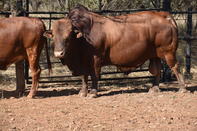
Records show that the Khoi people were already keeping herds of these cattle, in the south western parts of South Africa, by the time Jan van Riebeeck arrived at the Cape in 1652. These cattle played a crucial role in the Great Trek of 1834 onwards, where they were not only farmed but also used to pull ox wagons.
A studbook was formed to facilitate planned breeding in 1912, thanks to the efforts of Alex Holm, who at the time was the director of the Potchefstroom College of Agriculture and a champion of the breed, according to the Afrikaner Breeders Society.
The breed almost grew extinct a few years earlier when huge numbers died due to rinderpest or were destroyed during the Anglo Boer war. As new breeds were developed and imported, the breed lost favour and was primarily used for crossbreeding, which also threatened its existence.
Since 2010, the Afrikaner breed has enjoyed renewed interest, particularly because of its hardiness and ability to survive harsh climatic conditions, especially hot weather. This breed, in effect, has the potential to play a huge role in helping the beef industry address rising temperatures caused by climate change.
Attributes
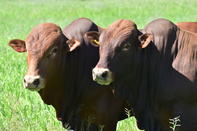
The Afrikaner is a medium to large cattle breed, usually with a deep red colour. They have long horns that turn upwards, although these are polled in commercial operations.
A mature bull weighs between 820 to 1090 kg, whereas a cow will weigh around 450 kg. The cattle do not have the compact block-like builds of many of the British breeds, but an oval build with strong legs, which allows them to travel long distances, good depth of body, and loose skin to tolerate the heat.
The Afrikaner’s migration from Asia resulted in only those animals that were best adapted to arid desert conditions, extreme heat, tropical diseases, and both internal and external parasites, reaching the southern tip of the continent. These qualities have resulted in the Afrikaner gaining the reputation of a “no-nonsense” breed. As such, it is one of the only breeds in South Africa that can truly be produced on extensive veld conditions throughout the year.
The cows make excellent mothers, with few calving problems and producing lots of milk.
Production Regions
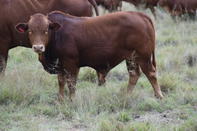
Thanks to the breed’s ability to tolerate a wide range of climatic conditions and its excellent ability to thrive on even poor quality veld, Afrikaner cattle are produced throughout South Africa, as well as in some of our neighbouring countries, such as Namibia, Zimbabwe, Zambia and Mozambique. The cattle are ideal for farming in game areas, since recent studies have revealed it is resistant to malignant catarrhal fever.
Uses
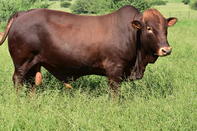
Thanks to the breed’s ability to tolerate a wide range of climatic conditions and its excellent ability to thrive on even poor quality veld, Afrikaner cattle are produced throughout South Africa, as well as in some of our neighbouring countries, such as Namibia, Zimbabwe, Zambia and Mozambique. The cattle are ideal for farming in game areas, since recent studies have revealed it is resistant to malignant catarrhal fever.
Meat Quality
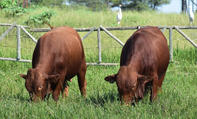
The Afrikaner has a strong genetic leaning toward juicy and tender meat, and recent studies have revealed that its meat quality is comparable with that of Angus cattle, which is regarded as the best beef cattle, and being fit for the restaurant business.
The hardiness of the Afrikaner makes it easy to finish them off in the veld, a term used to describe the fact that they do not have to go to a feedlot to put on additional weight before they are sent to the abattoir. Production of Afrikaner beef, therefore, almost borders on organic. The label, Afri Beef, was launched by the Afrikaner Breeders Society, as a marketing campaign, whereby Afrikaner beef has a guarantee to the quality of meat sold under this label.
For bulk or Afrikaner Beef export enquiries please use the enquiry link below.